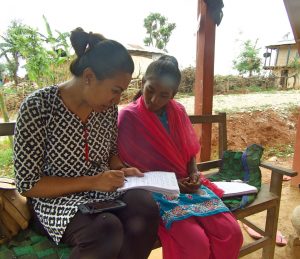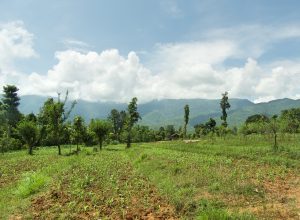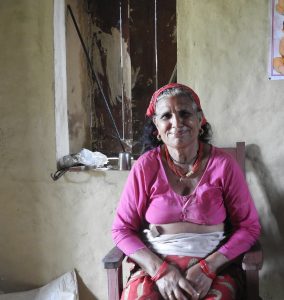This series of blog posts tells the stories of the people affected by chhaupadi, with a view to exploring different aspects of the practice in depth. All testimony and photographs in this series have been made available with the relevant subject’s express consent. A general introduction to chhaupadi is available here and there are more photographs in this album.
“When I had my first period, my mother told me to go to the chhau goth [hut], which made me very sad”, 17 year-old Balika says, recalling the first time she was forced to practice chhaupadi. Her mother may have been the one telling her to spend five days in the chhau goth every month, but Balika knows that she wasn’t the driving force behind the practice in her family. Her grandmother was the one who believed most fervently that women and girls are untouchable and impure during menstruation, and therefore need to be segregated from the rest of the family during this time.
Balika Bik during her interview with Dipika Shrestha, Girls Empowerment Officer with the Centre for Agro-Ecology and Development (CAED)
Balika, who is in Grade 10 and loves studying the Nepali language, gives answers to interview questions that never directly apportion blame. The story of how she escaped chhaupadi can be implied from the incidence of a series of important events over the last few years. “I had a grandmother who lived with us. I practiced while she was alive…not anymore now. She died two years after I first started menstruating.” Whether deliberately or not, Balika gives her interviewers another key piece of the puzzle during a different part of our conversation: “I used to stay in the chhau goth, but stopped doing so after two years.”
Plantations surrounding Gutu village, Surkhet District, where Balika lives
This gracious act of deference towards her late grandmother cannot be attributed to a fear of speaking out, because Balika confronted her parents on chhaupadi in an assertive way. She must have been aware that, with the views of the older generation becoming a thing of the past, her family had a valuable opportunity to reframe its attitudes towards women and natural reproductive processes. “I used what I learned in school and from the Centre for Agro-Ecology and Development to convince my parents to let me sleep inside.” To her, this has been the most critical improvement, although her family has adopted other reforms since her grandmother’s death that have helped to make her period a little more comfortable, and a whole lot more dignified. “I’m now allowed to touch and speak with boys and men”, Balika explains with a small, triumphant smile.
Hari Kala Poudel has seen many members of different generations come and go in Gutu village. Unlike Balika’s late grandmother, Hari is one of the few older women in the village who believes that women and girls should be allowed to sleep inside while menstruating.
Have all restrictions on what she can do when she is menstruating been lifted? “I’m still not allowed to enter the kitchen or any temple, or to worship at home”, Balika says. All in all, however, her tone and outlook are positive. “Most of all, I feel so relieved that my mother doesn’t force me into that hut anymore.”
Posted By Caroline Armstrong Hall (Nepal)
Posted Jul 16th, 2018





5 Comments
Corinne Cummings
July 16, 2018
Hi Caroline, I love the idea of conducting interviews for your blog postings. These first-hand accounts that you are sharing are very insightful for readers. I appreciate the young women sharing their story. It is interesting to hear their personal thoughts on the practice of chhaupadi. Balika is a strong young woman; I am glad to hear she confronted her parents and exercised assertiveness on this topic. No girl/woman should be banished during menstruation. This ingrained practice negatively affects the lives of these girls/women living in rural Nepal. Keep up the fantastic work. I look forward to hearing more from the community regarding chhaupadi. Best wishes, Corinne
Ali
July 16, 2018
Like Balika, I had a triumphant smile while reading this blog post! Although chauppadi is still such a large problem, it is so exciting to hear about such success stories. I look forward to learning more about the women and girls that you are conducting interviews with. Thanks Caroline!
Princia Vas
July 16, 2018
Thank you for sharing the story of Balika with us 🙂 Wonderful pictures too!
Good luck and I am sure you will do a good job in making a positive difference in the lives of these girls in Nepal.
Sam Givens
July 16, 2018
Thank you for posting this blog! This story is incredible to hear, I admire the bravery it took for Balika to say something. Much like what Corrine said, though Chhaupadi is still extremely prevalent today, it’s comforting knowing that small steps towards change is in the making. Thanks again Caroline!
iain
August 12, 2018
Like the way you’re offering us different perspectives on chhaupadi. This blog reinforces the widespread feeling that its the older generation – particularly the grannies and mothers in law – who are more determined to defend chhaupadi. Is this because they themselves went through it and don’t like the idea of youngsters taking the easy way out? It would be interesting to put the question to one of them…